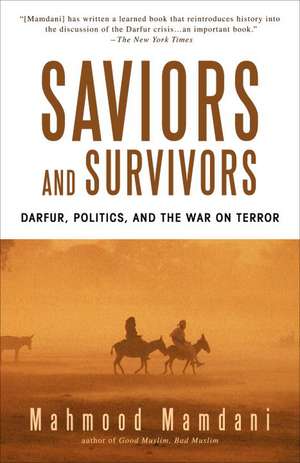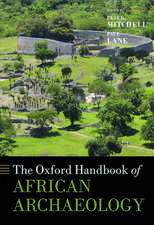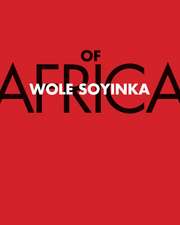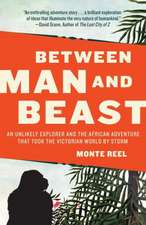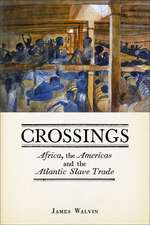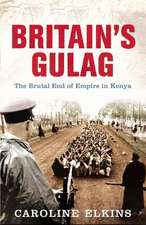Saviors and Survivors: Darfur, Politics, and the War on Terror
Autor Mahmood Mamdanien Limba Engleză Paperback – 30 apr 2010
In Saviors and Survivors, Mahmood Mamdani explains how the conflict in Darfur began as a civil war (1987—89) between nomadic and peasant tribes over fertile land in the south, triggered by a severe drought that had expanded the Sahara Desert by more than sixty miles in forty years; how British colonial officials had artificially tribalized Darfur, dividing its population into “native” and “settler” tribes and creating homelands for the former at the expense of the latter; how the war intensified in the 1990s when the Sudanese government tried unsuccessfully to address the problem by creating homelands for tribes without any. The involvement of opposition parties gave rise in 2003 to two rebel movements, leading to a brutal insurgency and a horrific counterinsurgency–but not to genocide, as the West has declared.
Mamdani also explains how the Cold War exacerbated the twenty-year civil war in neighboring Chad, creating a confrontation between Libya’s Muammar al-Qaddafi (with Soviet support) and the Reagan administration (allied with France and Israel) that spilled over into Darfur and militarized the fighting. By 2003, the war involved national, regional, and global forces, including the powerful Western lobby, who now saw it as part of the War on Terror and called for a military invasion dressed up as “humanitarian intervention.”
Incisive and authoritative, Saviors and Survivors will radically alter our understanding of the crisis in Darfur.
From the Hardcover edition.
Preț: 121.82 lei
Nou
Puncte Express: 183
Preț estimativ în valută:
23.31€ • 24.40$ • 19.40£
23.31€ • 24.40$ • 19.40£
Carte disponibilă
Livrare economică 10-24 martie
Preluare comenzi: 021 569.72.76
Specificații
ISBN-13: 9780385525961
ISBN-10: 0385525966
Pagini: 398
Dimensiuni: 132 x 203 x 23 mm
Greutate: 0.45 kg
Editura: Doubleday Religion
ISBN-10: 0385525966
Pagini: 398
Dimensiuni: 132 x 203 x 23 mm
Greutate: 0.45 kg
Editura: Doubleday Religion
Notă biografică
Mahmood Mamdani is Herbert Lehman Professor of Government and a member of the departments of anthropology; political science; and Middle East and Asian Languages and Cultures (MEALAC) at the School of International and Public Affairs at Columbia University. His previous books include Good Muslim, Bad Muslim; Citizen and Subject; and When Victims Become Killers. Originally from Uganda, he now divides his time between Kampala and New York, where he lives with his wife and son.
From the Hardcover edition.
From the Hardcover edition.
Extras
INTRODUCTION
The Save Darfur movement claims to have learned from Rwanda. But what is the lesson of Rwanda? For many of those mobilized to save Darfur, the lesson is to rescue before it is too late, to act before seeking to understand. Though it is never explicitly stated, Rwanda is recalled as a time when we thought we needed to know more; we waited to find out, to learn the difference between Tutsi and Hutu, and why one was killing the other, but it was too late. Needing to know turned into an excuse for doing nothing. What is new about Darfur, human rights interventionists will tell you, is the realization that sometimes we must respond ethically and not wait. That time is when genocide is occurring.
But how do we know it is genocide? Because we are told it is. This is why the battle for naming turns out to be all- important: Once Darfur is named as the site of genocide, people recognize something they have already seen elsewhere and conclude that what they know is enough to call for action. They need to know no more in order to act. But killing is not what defines genocide. Killing happens in war, in insurgency and counterinsurgency. It is killing with intent to eliminate an entire group—a race, for example—that is genocide.
Those who prioritize knowing over doing assume that genocide is the name of a consequence, and not its context or cause. But how do we decipher “intent” except by focusing on both context and consequence? The connection between the two is the only clue to naming an action. We shall see that the violence in Darfur was driven by two issues: one local, the other national. The local grievance focused on land and had a double background; its deep background was a colonial legacy of parceling Darfur between tribes, with some given homelands and others not; its immediate background was a four-decades-long process of drought and desertification that exacerbated the conflict between tribes with land and thosewithout.The national contextwas a rebellion that brought the state into an ongoing civil (tribal) war.
The conflict in Darfur began as a localized civil war (1987–89) and turned into a rebellion (beginning in 2003). That Darfur was the site of genocide was the view of one side in the civil war—the tribes with land whosought to keep out landless or land-poor tribes fleeing the advancing drought and desert. As early as the 1989 reconciliation conference in Darfur, that side was already using the language of “genocide”—and indeed “holocaust.” But that charge was made against the coalition of tribes they fought, and not against the government of Sudan. In spite of this important difference, that language has come to inform the view of those who blew the whistle—genocide—at theU.S. Holocaust Memorial Museum in 2004 and was translated into a unanimous resolution of both houses of theU.S.Congress that year.
Observers noted the exceptional brutality with which both sides fought the civil war. This derived in part from the zero-sum nature of the conflict: the land conflict was about group survival. If the stakes were already high, the lethal means to wage this bitter conflict were provided by external powers. In the opening phase, these deadly weapons came from adversaries in the Cold War over Chad: Colonel Muammar al-Quaddafi of Libya and the anti-Libyan triad (Reaganite America, France, and Israel); with the onset of rebellion, the government of Sudan stepped in to wage a brutal counterinsurgency, just as the managers of the War on Terror set about framing the government as genocidaire while shielding the insurgents in the name of justice.
There have been two international reports on the post-2003 violence in Darfur. The first was by the U.N. Commission on Darfur (2005) and the second from the prosecutor of the International Criminal Court (2008). Neither paid attention to the land question that has fueled the two-decades-long civil war in Darfur. Instead, they focused on those who had contributed to further militarizing the conflict. But even that focus was partial, limited to the government of Sudan; it was silent about the role of regional and international powers in exacerbating and militarizing the conflict over the Cold War and the subsequent War on Terror.
The U.N. Commission concluded “that the Government of Sudan has not pursued a policy of genocide,” for the element of “genocidal intent” was missing. It derived the government’s lack of genocidal intent from the context of the violence: “it would seem that those who planned and organized attacks on villages pursued the intent to drive the victims from their homes, primarily for purposes of counter-insurgency warfare.”1 In contrast, when the prosecutor of the International Criminal Court charged the president of Sudan, Omar Hasan Ahmad al-Bashir, with genocide, he focused on the consequences of the violence, not its context.
Let us compare deaths related to violence in two places: Darfur and Iraq. The Darfur insurgency began in 2003, the same year as the United States invaded Iraq. I discuss estimates of the number of “excess deaths” (that is, deaths beyond what would ordinarily be expected) in Darfur in chapter 1, but, briefly, the estimates for the period during which the violence was horrendous (2003–4) range from 70,000 to 400,000. Compare this with three available estimates of excess deaths in Iraq following the U.S. invasion in 2003.* The lowest comprehensive estimate, from the Iraqi Health Ministry survey, published in The New England Journal of Medicine, is of 400,000 Iraqi deaths, of which 151,000 are said to be “violent deaths.” A middling estimate is from the British medical journal The Lancet: an estimated 654,965 excess deaths, of which 601,027 are said to be violent. The highest estimate comes from a survey by Opinion Research Business, an independent polling agency located in London: 1,033,000 violent deaths as a result of the conflict. The first two estimates cover the period from the 2003 invasion to June 2006. The third survey extends to August 2007.2
Not only are the figures for Iraq far higher than those for Darfur, ranging from a low of 400,000 to a high of 1,033,000, but the proportion of violent deaths in relation to the total excess mortality is also far higher in Iraq than in Darfur: 38 percent to nearly 92 percent in Iraq, but 20 to 30 percent in Darfur. So why do we call the killing in Darfur genocide but not that in Iraq? Is it because, despite the wide disparity in the number of excess deaths, whether violence- related or violent, victims and perpetrators belong to different races in Darfur but not in Iraq? That is what many assume, but the facts do not bear this out.
Those who blew the whistle on Darfur in 2004 have continued to argue, for almost four years, that the violence in Darfur is racially motivated, perpetrated by “light- skinned Arabs” on “black Africans.” In the chapters that follow, I suggest that this kind of framing of the violence continues the error that came out of the colonial tradition of racializing the peoples of Sudan.
This book invites the reader to rethink Rwanda in light of Darfur. Rather than a call to act in the face of moral certainty, it is an argument against those who substitute moral certainty for knowledge, and who feel virtuous even when acting on the basis of total ignorance.
Indeed, the lesson of Darfur is a warning to those who would act first and understand later. Only those possessed of disproportionate power can afford to assume that knowing is irrelevant, thereby caring little about the consequences of their actions. Not only is this mind-set the driving force behind the War on Terror, it also provides the selfindulgent motto of the human rights interventionist recruited into the ranks of the terror warriors. This feel-good imperative can be summed up as follows: as long as I feel good, nothing else matters. It is this shared mind-set that has turned the movement to Save Darfur into the humanitarian face of the War on Terror.
In contrast to those who suggest that we act the minute the whistle blows, I suggest that, even before the whistle blows, we ceaselessly try to know the world in which we live—and act. Even if we must act on imperfect knowledge, we must never act as if knowing is no longer relevant.
Save Darfur activists combine a contemptuous attitude toward knowing with an imperative to act. Trying hard not to be “good Germans,” they employ techniques of protest politics against their own government—and now the government of China—and turn a deaf ear to experts who they claim only complicate the story with so many details as to miss the main point. Instead, they rely on the evidence of their eyes and avoid any discussion of context. But by letting pictures and interviews do the talking, they have opened an entire movement to “the CNN effect.” If “good Germans” were taught to trust their leaders first and ask questions later, the good souls mobilized to save Darfur are taught to trust pictures above all else and ask questions later. Above all, they strip Darfur—and the violence in Darfur—of context.
I put Darfur as well as Rwanda in a national, African, and global context, which over the past century has been one of colonialism, the Cold War, and the War on Terror. In 2001, I wrote a book on the Rwanda genocide in which I warned against conferring an ethic of impunity on those who resist genocide. Such impunity led to the killing of some of the millions who died in Congo between 1998 and 2002. Equally, I warned against turning Nuremburg into a paradigm for victors’ justice and employing it as a response to the Rwanda genocide. For a continent where a relentless pursuit of justice in the postindependence period had all too often turned into vengeance, a more relevant paradigm would be that of survivors’ justice. Based on South Africa’s transition to a postapartheid society, it would seek to reconcile rather than to punish, to look forward rather than backward.
Calling the violence in Darfur genocide has had three consequences. First, it has postponed any discussion of context while imposing the view of one party in the 1987–89 civil war in the name of stopping the “genocide.” Second, it has conferred impunity on these same partisans by casting them as resisters to genocide. Finally, the description of the violence as genocide—racial killing—has served to further racialize the conflict and give legitimacy to those who seek to punish rather than to reconcile. Thus, the movement to save Darfur, which initially had the salutary effect of directing world attention to the horrendous violence in Darfur in 2003–4,must now bear some of the blame for delaying reconciliation by focusing on a single- minded pursuit of revenge as punishment.
There is an important difference between Rwanda and Darfur. Rwanda was the site of genocide. Darfur is not. It is, rather, the site where the language of genocide has been turned into an instrument. It is where genocide has become ideological.
From the Hardcover edition.
The Save Darfur movement claims to have learned from Rwanda. But what is the lesson of Rwanda? For many of those mobilized to save Darfur, the lesson is to rescue before it is too late, to act before seeking to understand. Though it is never explicitly stated, Rwanda is recalled as a time when we thought we needed to know more; we waited to find out, to learn the difference between Tutsi and Hutu, and why one was killing the other, but it was too late. Needing to know turned into an excuse for doing nothing. What is new about Darfur, human rights interventionists will tell you, is the realization that sometimes we must respond ethically and not wait. That time is when genocide is occurring.
But how do we know it is genocide? Because we are told it is. This is why the battle for naming turns out to be all- important: Once Darfur is named as the site of genocide, people recognize something they have already seen elsewhere and conclude that what they know is enough to call for action. They need to know no more in order to act. But killing is not what defines genocide. Killing happens in war, in insurgency and counterinsurgency. It is killing with intent to eliminate an entire group—a race, for example—that is genocide.
Those who prioritize knowing over doing assume that genocide is the name of a consequence, and not its context or cause. But how do we decipher “intent” except by focusing on both context and consequence? The connection between the two is the only clue to naming an action. We shall see that the violence in Darfur was driven by two issues: one local, the other national. The local grievance focused on land and had a double background; its deep background was a colonial legacy of parceling Darfur between tribes, with some given homelands and others not; its immediate background was a four-decades-long process of drought and desertification that exacerbated the conflict between tribes with land and thosewithout.The national contextwas a rebellion that brought the state into an ongoing civil (tribal) war.
The conflict in Darfur began as a localized civil war (1987–89) and turned into a rebellion (beginning in 2003). That Darfur was the site of genocide was the view of one side in the civil war—the tribes with land whosought to keep out landless or land-poor tribes fleeing the advancing drought and desert. As early as the 1989 reconciliation conference in Darfur, that side was already using the language of “genocide”—and indeed “holocaust.” But that charge was made against the coalition of tribes they fought, and not against the government of Sudan. In spite of this important difference, that language has come to inform the view of those who blew the whistle—genocide—at theU.S. Holocaust Memorial Museum in 2004 and was translated into a unanimous resolution of both houses of theU.S.Congress that year.
Observers noted the exceptional brutality with which both sides fought the civil war. This derived in part from the zero-sum nature of the conflict: the land conflict was about group survival. If the stakes were already high, the lethal means to wage this bitter conflict were provided by external powers. In the opening phase, these deadly weapons came from adversaries in the Cold War over Chad: Colonel Muammar al-Quaddafi of Libya and the anti-Libyan triad (Reaganite America, France, and Israel); with the onset of rebellion, the government of Sudan stepped in to wage a brutal counterinsurgency, just as the managers of the War on Terror set about framing the government as genocidaire while shielding the insurgents in the name of justice.
There have been two international reports on the post-2003 violence in Darfur. The first was by the U.N. Commission on Darfur (2005) and the second from the prosecutor of the International Criminal Court (2008). Neither paid attention to the land question that has fueled the two-decades-long civil war in Darfur. Instead, they focused on those who had contributed to further militarizing the conflict. But even that focus was partial, limited to the government of Sudan; it was silent about the role of regional and international powers in exacerbating and militarizing the conflict over the Cold War and the subsequent War on Terror.
The U.N. Commission concluded “that the Government of Sudan has not pursued a policy of genocide,” for the element of “genocidal intent” was missing. It derived the government’s lack of genocidal intent from the context of the violence: “it would seem that those who planned and organized attacks on villages pursued the intent to drive the victims from their homes, primarily for purposes of counter-insurgency warfare.”1 In contrast, when the prosecutor of the International Criminal Court charged the president of Sudan, Omar Hasan Ahmad al-Bashir, with genocide, he focused on the consequences of the violence, not its context.
Let us compare deaths related to violence in two places: Darfur and Iraq. The Darfur insurgency began in 2003, the same year as the United States invaded Iraq. I discuss estimates of the number of “excess deaths” (that is, deaths beyond what would ordinarily be expected) in Darfur in chapter 1, but, briefly, the estimates for the period during which the violence was horrendous (2003–4) range from 70,000 to 400,000. Compare this with three available estimates of excess deaths in Iraq following the U.S. invasion in 2003.* The lowest comprehensive estimate, from the Iraqi Health Ministry survey, published in The New England Journal of Medicine, is of 400,000 Iraqi deaths, of which 151,000 are said to be “violent deaths.” A middling estimate is from the British medical journal The Lancet: an estimated 654,965 excess deaths, of which 601,027 are said to be violent. The highest estimate comes from a survey by Opinion Research Business, an independent polling agency located in London: 1,033,000 violent deaths as a result of the conflict. The first two estimates cover the period from the 2003 invasion to June 2006. The third survey extends to August 2007.2
Not only are the figures for Iraq far higher than those for Darfur, ranging from a low of 400,000 to a high of 1,033,000, but the proportion of violent deaths in relation to the total excess mortality is also far higher in Iraq than in Darfur: 38 percent to nearly 92 percent in Iraq, but 20 to 30 percent in Darfur. So why do we call the killing in Darfur genocide but not that in Iraq? Is it because, despite the wide disparity in the number of excess deaths, whether violence- related or violent, victims and perpetrators belong to different races in Darfur but not in Iraq? That is what many assume, but the facts do not bear this out.
Those who blew the whistle on Darfur in 2004 have continued to argue, for almost four years, that the violence in Darfur is racially motivated, perpetrated by “light- skinned Arabs” on “black Africans.” In the chapters that follow, I suggest that this kind of framing of the violence continues the error that came out of the colonial tradition of racializing the peoples of Sudan.
This book invites the reader to rethink Rwanda in light of Darfur. Rather than a call to act in the face of moral certainty, it is an argument against those who substitute moral certainty for knowledge, and who feel virtuous even when acting on the basis of total ignorance.
Indeed, the lesson of Darfur is a warning to those who would act first and understand later. Only those possessed of disproportionate power can afford to assume that knowing is irrelevant, thereby caring little about the consequences of their actions. Not only is this mind-set the driving force behind the War on Terror, it also provides the selfindulgent motto of the human rights interventionist recruited into the ranks of the terror warriors. This feel-good imperative can be summed up as follows: as long as I feel good, nothing else matters. It is this shared mind-set that has turned the movement to Save Darfur into the humanitarian face of the War on Terror.
In contrast to those who suggest that we act the minute the whistle blows, I suggest that, even before the whistle blows, we ceaselessly try to know the world in which we live—and act. Even if we must act on imperfect knowledge, we must never act as if knowing is no longer relevant.
Save Darfur activists combine a contemptuous attitude toward knowing with an imperative to act. Trying hard not to be “good Germans,” they employ techniques of protest politics against their own government—and now the government of China—and turn a deaf ear to experts who they claim only complicate the story with so many details as to miss the main point. Instead, they rely on the evidence of their eyes and avoid any discussion of context. But by letting pictures and interviews do the talking, they have opened an entire movement to “the CNN effect.” If “good Germans” were taught to trust their leaders first and ask questions later, the good souls mobilized to save Darfur are taught to trust pictures above all else and ask questions later. Above all, they strip Darfur—and the violence in Darfur—of context.
I put Darfur as well as Rwanda in a national, African, and global context, which over the past century has been one of colonialism, the Cold War, and the War on Terror. In 2001, I wrote a book on the Rwanda genocide in which I warned against conferring an ethic of impunity on those who resist genocide. Such impunity led to the killing of some of the millions who died in Congo between 1998 and 2002. Equally, I warned against turning Nuremburg into a paradigm for victors’ justice and employing it as a response to the Rwanda genocide. For a continent where a relentless pursuit of justice in the postindependence period had all too often turned into vengeance, a more relevant paradigm would be that of survivors’ justice. Based on South Africa’s transition to a postapartheid society, it would seek to reconcile rather than to punish, to look forward rather than backward.
Calling the violence in Darfur genocide has had three consequences. First, it has postponed any discussion of context while imposing the view of one party in the 1987–89 civil war in the name of stopping the “genocide.” Second, it has conferred impunity on these same partisans by casting them as resisters to genocide. Finally, the description of the violence as genocide—racial killing—has served to further racialize the conflict and give legitimacy to those who seek to punish rather than to reconcile. Thus, the movement to save Darfur, which initially had the salutary effect of directing world attention to the horrendous violence in Darfur in 2003–4,must now bear some of the blame for delaying reconciliation by focusing on a single- minded pursuit of revenge as punishment.
There is an important difference between Rwanda and Darfur. Rwanda was the site of genocide. Darfur is not. It is, rather, the site where the language of genocide has been turned into an instrument. It is where genocide has become ideological.
From the Hardcover edition.
Recenzii
“Mahmood Mamdani . . . is one of the most penetrating analysts of African affairs. In Saviors and Survivors: Darfur, Politics, and the War on Terror, he has written a learned book that reintroduces history into the discussion of the Darfur crisis and questions the logic and even the good faith of those who seek to place it at the pinnacle of Africa’s recent troubles . . . [An] important book . . .”
—Howard W. French, The New York Times
“Say ‘Darfur’ and horrific images leap to mind: Janjaweed, rape, genocide. But most of us would be hard-pressed to explain the violence there, beyond the popular notion that it’s ethnic cleansing of Africans by Arabs. Columbia University scholar Mahmood Mamdani’s brilliant new book, Saviors and Survivors, explains why this assumption is faulty, and why it’s foiling peace efforts.”
—Katie Baker, Newsweek
“Mahmood Mamdani . . . demonstrates just how politically charged the word ‘genocide’ has become, and how many shady agendas it can serve, even among those purporting to act in the name of universal values . . . His extensively documented study of the political and media circus that came to surround the hitherto uncelebrated province of Darfur is a vivid demonstration of the predictably calamitous results of outsiders meddling in places whose history, politics, and culture they can hardly be bothered to read up on.”
—Benjamin Moser, Harper’s Magazine
“Very few books on the Darfur crisis have provided such a good analysis of what is happening in the region and very few voices have attempted to understand the crisis in its local, regional, and international context. Very few books have attempted to discuss the crisis in its historical and geopolitical context. In reality discovering such an insightful book is like finding a needle in the sea.”
—Al-Quds al-Arabi (London)
“Whatever one thinks about Saviors and Survivors, the study and practice of contemporary Sudanese politics, humanitarian concerns, peace-making and peace keeping has received a jolt to the present paradigms that may get us all thinking at a new level of depth. Let’s hope that it will be lessons learned, and not repeated and congratulations to Dr. Mamdani for the clarity and courage to challenge conventional ‘wisdom’.”
—Richard Lobban, Bulletin of the Sudan Studies Association of the USA.
“There are three reasons why this book’s perspective on the Sudan-Darfur conflict may be of considerable value to readers interested in African politics and international relations. First, Saviors and Survivors is unique in that it presents an African-centered perspective on the Sudan-Darfur crisis in the context of the study of international relations, geopolitics and the War on Terror. Second, it draws attention to African regional, epistemological and ideological perspectives on the crisis. Third, it tackles the bogeyman of African politics—the national-ethnic question in the context of cultural pluralism . . . Hidden in the middle of Saviors and Survivors’ controversial thesis critiquing international interventionism is Mamdani’s scholarly genius. The book scrutinizes, critically analyzes, deconstructs and reconstructs the deep historical transformations that constitute the underbelly of the continent’s post-colonial citizenship structures.”
—African Affairs (London)
“Mamdani’s book is by far the most exhaustive study of the conflict and is carried out with an impressive display of investigative prowess and referencing . . . This study is reassuring in its learned dependence on a great variety of sources and an admirable depth of research. Indeed, the reader will discover that Darfur is not quite the mysterious and unknown place that we have tended to imagine . . . It is to be hoped that this book is widely read and debated.”
—John C. Caldwell, Population and Development Review
“[A] sweeping history of Darfur . . . Mamdani argues that calling the events in Darfur genocide is inaccurate and irresponsible . . . He believes that the West’s concern with Darfur is a preferred distraction from the failed U.S. occupation in Iraq, offering Western citizens a means to reclaim the moral high ground . . . [P]rovide[s] valuable historical and cultural background to recent events in Darfur and the sure-to-continue scholarly debate on genocide.”
—Veronica Arellano, Library Journal
“Mamdani traces the path to the Darfur tragedy through its historical and colonial roots to the current situation, where drought and desertification have led to conflict over land among local tribes, rebellion, and finally to the brutal involvement of the forces of the state and to the efforts of the United Nations and others to help the victims and stop the violence. His radical reevaluation of the Darfur problem is a major contribution to understanding and, it is to be hoped, to ending a shocking human disaster.”
—Sir Brian Urquhart, former Under-Secretary-General of the United Nations
“A brilliantly argued and profoundly challenging critique of liberal support for humanitarian intervention in Darfur. Beyond this, Mamdani sets forth an alternative approach to such catastrophic situations. This book should be required reading for the Obama foreign policy team.”
—Richard Falk, United Nations Special Rapporteur and Professor Emeritus, Princeton University
“An incisive and challenging analysis. Framing both Darfur’s war and the ‘Save Darfur’ movement within the paradigm of the West’s historic colonial encounter with Africa, Mahmood Mamdani challenges the reader to reconsider whether Darfur’s crisis is ‘genocide’ warranting foreign military intervention.”
—Alex de Waal, Fellow at Harvard University’s Kennedy School of Government and author of War in Darfur
“Mahmood Mamdani has turned his fearless independence of mind on Darfur, Sudan, and the so-called ‘War on Terror,’ producing a book that is as passionate and well-informed as it is intelligent and (for those used only to surface orthodoxies) challenging.”
—Conor Gearty, Director of the Centre for the Study of Human Rights at the London School of Economics
“A necessary contribution to the literature surrounding both humanitarian aid and African geopolitics.”
—Kirkus Reviews
From the Hardcover edition.
—Howard W. French, The New York Times
“Say ‘Darfur’ and horrific images leap to mind: Janjaweed, rape, genocide. But most of us would be hard-pressed to explain the violence there, beyond the popular notion that it’s ethnic cleansing of Africans by Arabs. Columbia University scholar Mahmood Mamdani’s brilliant new book, Saviors and Survivors, explains why this assumption is faulty, and why it’s foiling peace efforts.”
—Katie Baker, Newsweek
“Mahmood Mamdani . . . demonstrates just how politically charged the word ‘genocide’ has become, and how many shady agendas it can serve, even among those purporting to act in the name of universal values . . . His extensively documented study of the political and media circus that came to surround the hitherto uncelebrated province of Darfur is a vivid demonstration of the predictably calamitous results of outsiders meddling in places whose history, politics, and culture they can hardly be bothered to read up on.”
—Benjamin Moser, Harper’s Magazine
“Very few books on the Darfur crisis have provided such a good analysis of what is happening in the region and very few voices have attempted to understand the crisis in its local, regional, and international context. Very few books have attempted to discuss the crisis in its historical and geopolitical context. In reality discovering such an insightful book is like finding a needle in the sea.”
—Al-Quds al-Arabi (London)
“Whatever one thinks about Saviors and Survivors, the study and practice of contemporary Sudanese politics, humanitarian concerns, peace-making and peace keeping has received a jolt to the present paradigms that may get us all thinking at a new level of depth. Let’s hope that it will be lessons learned, and not repeated and congratulations to Dr. Mamdani for the clarity and courage to challenge conventional ‘wisdom’.”
—Richard Lobban, Bulletin of the Sudan Studies Association of the USA.
“There are three reasons why this book’s perspective on the Sudan-Darfur conflict may be of considerable value to readers interested in African politics and international relations. First, Saviors and Survivors is unique in that it presents an African-centered perspective on the Sudan-Darfur crisis in the context of the study of international relations, geopolitics and the War on Terror. Second, it draws attention to African regional, epistemological and ideological perspectives on the crisis. Third, it tackles the bogeyman of African politics—the national-ethnic question in the context of cultural pluralism . . . Hidden in the middle of Saviors and Survivors’ controversial thesis critiquing international interventionism is Mamdani’s scholarly genius. The book scrutinizes, critically analyzes, deconstructs and reconstructs the deep historical transformations that constitute the underbelly of the continent’s post-colonial citizenship structures.”
—African Affairs (London)
“Mamdani’s book is by far the most exhaustive study of the conflict and is carried out with an impressive display of investigative prowess and referencing . . . This study is reassuring in its learned dependence on a great variety of sources and an admirable depth of research. Indeed, the reader will discover that Darfur is not quite the mysterious and unknown place that we have tended to imagine . . . It is to be hoped that this book is widely read and debated.”
—John C. Caldwell, Population and Development Review
“[A] sweeping history of Darfur . . . Mamdani argues that calling the events in Darfur genocide is inaccurate and irresponsible . . . He believes that the West’s concern with Darfur is a preferred distraction from the failed U.S. occupation in Iraq, offering Western citizens a means to reclaim the moral high ground . . . [P]rovide[s] valuable historical and cultural background to recent events in Darfur and the sure-to-continue scholarly debate on genocide.”
—Veronica Arellano, Library Journal
“Mamdani traces the path to the Darfur tragedy through its historical and colonial roots to the current situation, where drought and desertification have led to conflict over land among local tribes, rebellion, and finally to the brutal involvement of the forces of the state and to the efforts of the United Nations and others to help the victims and stop the violence. His radical reevaluation of the Darfur problem is a major contribution to understanding and, it is to be hoped, to ending a shocking human disaster.”
—Sir Brian Urquhart, former Under-Secretary-General of the United Nations
“A brilliantly argued and profoundly challenging critique of liberal support for humanitarian intervention in Darfur. Beyond this, Mamdani sets forth an alternative approach to such catastrophic situations. This book should be required reading for the Obama foreign policy team.”
—Richard Falk, United Nations Special Rapporteur and Professor Emeritus, Princeton University
“An incisive and challenging analysis. Framing both Darfur’s war and the ‘Save Darfur’ movement within the paradigm of the West’s historic colonial encounter with Africa, Mahmood Mamdani challenges the reader to reconsider whether Darfur’s crisis is ‘genocide’ warranting foreign military intervention.”
—Alex de Waal, Fellow at Harvard University’s Kennedy School of Government and author of War in Darfur
“Mahmood Mamdani has turned his fearless independence of mind on Darfur, Sudan, and the so-called ‘War on Terror,’ producing a book that is as passionate and well-informed as it is intelligent and (for those used only to surface orthodoxies) challenging.”
—Conor Gearty, Director of the Centre for the Study of Human Rights at the London School of Economics
“A necessary contribution to the literature surrounding both humanitarian aid and African geopolitics.”
—Kirkus Reviews
From the Hardcover edition.
